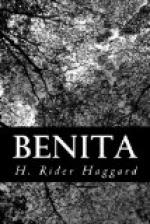Though at the time Benita took little note of such details, the passage beyond and the stair descending from it showed the same perfect workmanship. Evidently this secret way dated not from the Portuguese period, but from that of the Phoenicians or other ancients, to whose treasure-chamber it was the approach, opening as it did from their holy of holies, to which none were admitted save the head priests. The passage, which was about seven feet high by four wide, had been hewn out of the live rock of the mountain, for thousands of little marks left by the workmen’s chisels were still discernible upon its walls. So it was with the stair, that had been but little used, and remained fresh as the day when it was finished.
Down the steps, candle in hand, flitted Benita, counting them as she went. The thirtieth brought her to a landing. Here it was that she saw the first traces of that treasure which they had suffered so much to find. Something glittered at her feet. She picked it up. It was a little bar of gold weighing two or three ounces that doubtless had been dropped there. Throwing it down again she looked in front of her, and to her dismay saw a door of wood with iron bolts. But the bolts had never been shot, and when she pulled at it the door creaked upon its rusty hinges and opened. She was on the threshold of the treasure-chamber!
It was square and of the size of a small room, packed on either side almost to the low, vaulted roof with small bags of raw hide, carelessly arranged. Quite near to the door one of these bags had slipped down and burst open. It was filled with gold, some in ingots and some in raw nuggets, for there they lay in a shining, scattered heap. As she stooped to look it came into the mind of Benita that her father had said that in her trance she had told them that one of the bags of treasure was burst, and that the skin of which it had been made was black and red. Behold! before her lay the burst bag, and the colour of the hide was black and red.
She shivered. The thing was uncanny, terrible. Uncanny was it also to see in the thick dust, which in the course of twenty or more of centuries had gathered on the floor, the mark of footprints, those of the last persons who had visited this place. There had been two of them, a man and a woman, and they were no savages, for they wore shoes. Benita placed her foot in the print left by that dead woman. It filled it exactly, it might have been her own. Perhaps, she thought to herself, that other Benita had descended here with her father, after the Portuguese had hidden away their wealth, that she might be shown where it was, and of what it consisted.
One more glance at all this priceless, misery-working gold, and on she went, she who was seeking the gold of life and liberty for herself and him who lay above. Supposing that the stairway ended there? She stopped, she looked round, but could see no other door. To see the better she halted and opened the glass of her lantern. Still she could perceive nothing, and her heart sank. Yet why did the candle flicker so fiercely? And why was the air in this deep place so fresh? She walked forward a pace or two, then noticed suddenly that those footprints of the dead that she was following disappeared immediately in front of her, and she stopped.




